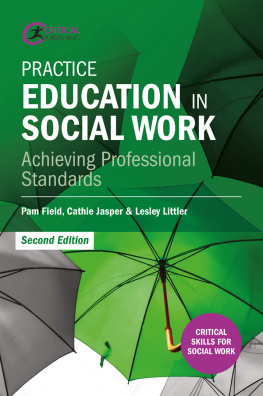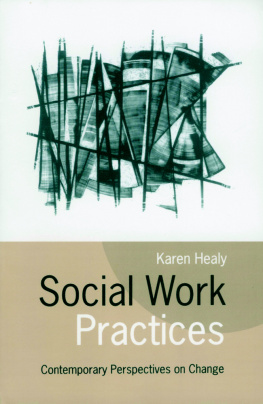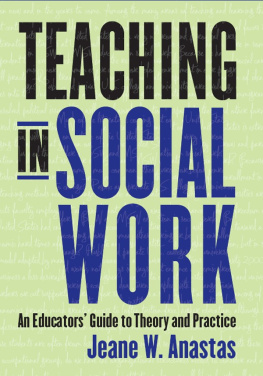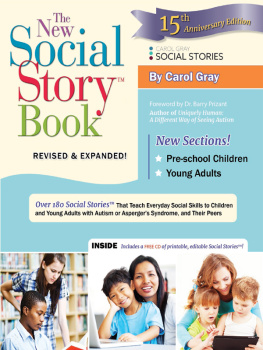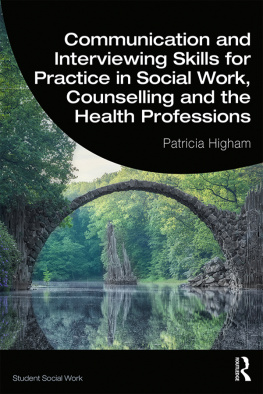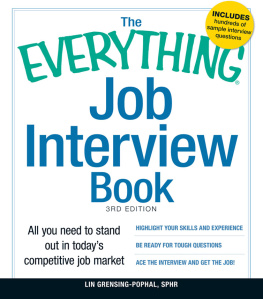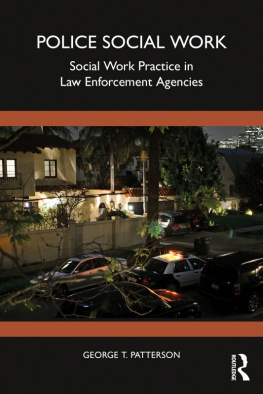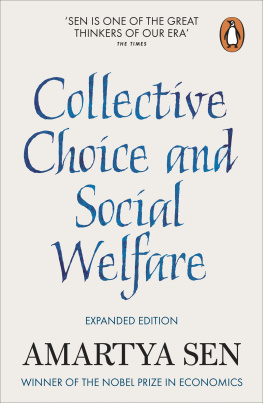THE SOCIAL WORK INTERVIEW
THE SOCIAL WORK INTERVIEW
FIFTH EDITION
Alfred Kadushin and Goldie Kadushin
COLUMBIA UNIVERSITY PRESS
NEW YORK

COLUMBIA UNIVERSITY PRESS
Publishers Since 1893
New York Chichester, West Sussex
cup.columbia.edu
Copyright 2013 Columbia University Press
All rights reserved
ISBN 978-0-231-53488-8 (e-book)
Library of Congress Cataloging-in-Publication Data
Kadushin, Alfred.
The social work interview / Alfred Kadushin and Goldie Kadushin.Fifth edition.
pages cm
Includes bibliographical references and index.
ISBN 978-0-231-13580-1 (cloth : alk. paper)ISBN 978-0-231-13581-8 (pbk. : alk. paper)ISBN 978-0-231-53488-8 (e-book)
1. Interviewing. 2. Social service. I. Kadushin, Goldie. II. Title.
HV43.K26 2013
361.322dc23
2012050821
COVER DESIGN: Jordan Wannemacher
A Columbia University Press E-book.
CUP would be pleased to hear about your reading experience with this e-book at cup-ebook@columbia.edu.
References to Web sites (URLs) were accurate at the time of writing. Neither the author nor Columbia University Press is responsible for URLs that may have expired or changed since the manuscript was prepared.
In loving memory of a lifetime partner,
friend, and companion: Sylvia.
AK
To my father, who shared the privilege of his friendship, knowledge, and wisdom during the writing of this book; to my mother, whose memory was part of this collaboration; and to Steve, my collaborator in life.
GK
CONTENTS
OUR THANKS TO LAUREN DOCKETT, who provided editorial support at Columbia University Press for the fifth edition, and to her very capable successor, Jennifer Perillo, who was instrumental in seeing the book through to publication. We are also indebted to Jane Linzmeyer, the librarian at the University of WisconsinMadison School of Social Work, for her gracious assistance with references, and to Kristin Beebe, for her expertise in preparing and formatting the manuscript.
MANY PEOPLE in many different professions conduct interviews. Social workers are only one such group. But for social workers, interviewing is a preeminently important activity. In fact, carrying out most of their responsibilities depends on interviewing. Social work interviews differ from those of other professional groups in some crucial ways, reflecting what is unique about social work. This book describes the general art of interviewing as adapted and used by social workers in a social agency setting. Both experienced and inexperienced practitioners, struggling with the recurrent problems of interviewing and seeking specific guidelines and answers, may profit from an explicit examination of the interview. We hope this book will stimulate self-assessment.
A major part of the book is concerned with the techniques of social work interviewing. Technique has a bad soundcold, mechanical, inhuman, manipulative: applicable to things but not to people. The word deserves to be rescued, its image refurbished. Techniques are devices whose application enables us to accomplish our purposes, to carry out our professional responsibilities. They are clear formulations of what we should do in a given situation to offer our service effectively and efficiently.
Technical skill is not antithetical to spontaneity. In fact, it permits a higher form of spontaneity. The skilled interviewer can deliberately violate the techniques as the occasion demands and apply techniques with greater discrimination. Awareness and command of technical knowledge have other advantages. To be technically skilled is to be prepared; to be prepared is to experience less anxiety; and less anxiety increases the interviewers freedom to respond fully to the interviewee.
Competent artistry requires mastery of technology. The French have a saying: It is necessary to know geometry to build a cathedral; building a cathedral is, however, an act of faithand, we would add, an artistic creation. But neither the act of faith nor the art would be possible without the knowledge of geometry.
Another objection to concern with technique derives from the sentiment that technique is unimportant, a poor second to the feeling the social worker has for the client. If the workers attitude is right, everything will be right; if it is wrong, no technical expertise can rescue the interview from failure. The viewpoint is expressed well in a Chinese maxim: When the right person uses the wrong means, the wrong means work in the right way; when the wrong person uses the right means, the right means work in the wrong way. But what, then, is the power of the right people using the right means in the right way? Surely they accomplish more and do it more efficiently than the right people using the wrong means even if they do work in the right way.
Many might say that if they had to choose between feeling and technique, they would choose feeling. Perhaps so, but if we have to choose between these qualifications, we have already done the client an injustice. We should be able to offer the client an interviewer who is both attitudinally correct and technically proficient. The best interviewer combines the appropriate feelings and attitudes with skilled interviewing techniques. The emphasis should be on the geometry, the technical knowledge that gives substance to our faith and enables us to implement our goodwill.
The greater measure of truth lies, as is so often the case, not with either/or but with both. If technique without feeling is ineffectual, feeling without technique is inefficient. If technical competence without compassion is sterile, compassion without competence is an exercise in futility.
A good relationship is a necessary but not sufficient condition for good interviewing. Good technique permits optimum use of a relationship. A good technician working in the context of a modest relationship is apt to achieve a better outcome than a technically inept interviewer in an excellent relationship. The emotional response of the interviewer may be unfailingly correct. Yet feeling does not automatically translate into effective interview behavior. And clients respond more to behavior than to feelings. Only as feelings are manifested in behaviorverbal, nonverbal, open, or covertdo they have an effect on the client.
Teaching good interviewing technique is a matter of guiding the student to learn how to manifest the appropriate feelings behaviorally by applying the correct techniques, because correct techniques are the behavioral translation of the helpful attitude. But can a book teach social work interviewing techniques? The answer is, of course not! Knowing about is clearly different from knowing how. Ultimately, we learn interviewing only through doing. But even though to know is a far cry from to do, it is still an advance over not knowing what action is desirable. A book on interviewing is like a manual on courtship. No manual can tell lovers how to achieve their aims. But such books can, according to Dexter (1970, 24), suggest some of the issues and tactics which are worth thinking about, consideration of which can make victory somewhat more likely.
Clearly, someone can know all about the techniques of interviewing and yet be unable to apply them effectively. Some gifted practitioners also perform brilliantly without being able to say what they do or how they do it, often achieving success while breaking all the technical prescriptions. Further, the contention that good interviewers are born, not made, has some truth to it. Some intuitively gifted people seem to have a natural competence in the art of good personal relationships, of which interviewing is only a special example. But both those with a natural aptitude and those who interview well without knowing exactly what it is they are doing can profit from a conscious examination of their art. Whatever the limits of our natural capacities, learning may extend them.
Next page

